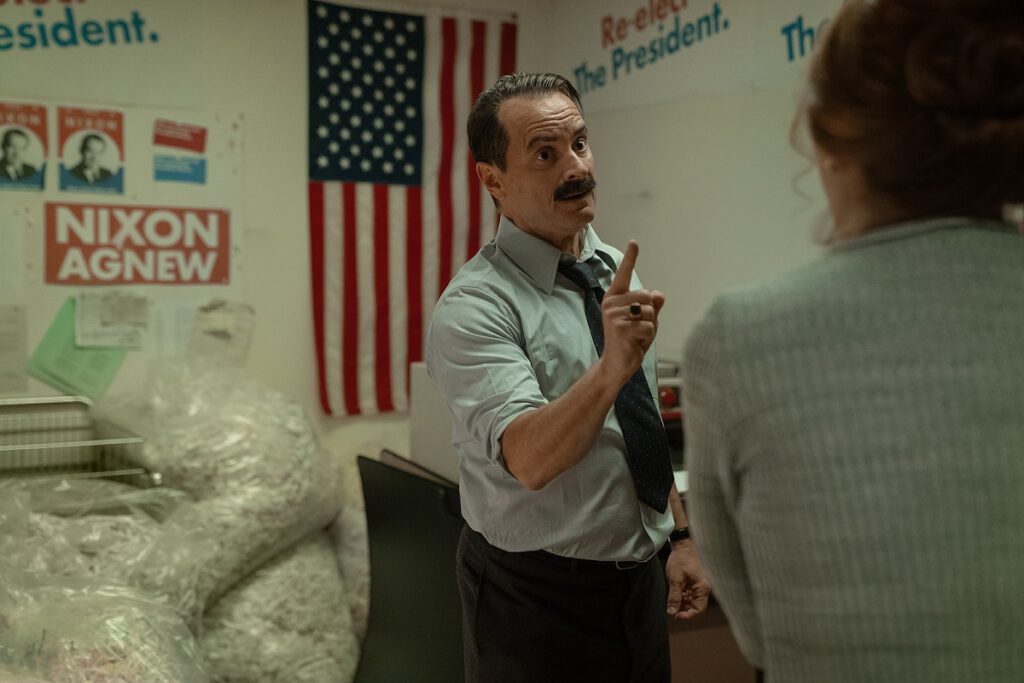“Gaslit” is many things. It’s a portrayal of the outspoken Martha Mitchell (Julia Roberts), the wife of Nixon-era Attorney General John Mitchell (Sean Penn), and her struggle to speak her mind in the aftermath of Watergate. It’s a rendering of the catastrophically incompetent White House Plumbers, hired to perform espionage on the Democrats, and failing in spectacular, felonious ways. This is a series that features career-best work from multiple cast members: Julia Roberts as the glamorous, empowered, yet ultimately abused woman, tossed aside in service of corruption; Dan Stevens, near-flawless as the insecure and fearful John Dean; Hamish Linklater as the antsy bootlicker Jeb Magruder; even Sean Penn sheds his Sean Penn-ness to knock it out of the park as a craven government official who will have his wife forcibly sedated and held hostage, if it means protecting his lord and savior Richard Nixon.
But most of all, this is the G. Gordon Liddy Show. Shea Whigham’s performance as the only White House Plumber to never name names is one for the ages. His hair is dyed jet black, with a mustache to boot; he doesn’t blink, and sometimes his entire face above his mouth doesn’t move at all. Whigham delivers, with equal parts panache and soul, a perfect portrayal of a man who operates outside the bounds of normalcy in every conceivable way; to Liddy, none of this is anything less than an 11th-century crusade to preserve America. Whigham’s body swells as he corners Magruder; he causes Dean to physically shrink in his presence. And although Liddy’s zeal can be seen from space, he has honor. He petrifies his colleagues into delirium, but he adores his children. This is a landmark role for Whigham, one that will be celebrated and studied for decades to come. I spoke with Whigham about his performance on “Gaslit” last week.
I think this is the role of your lifetime. Would you agree?
Thank you. Yeah, well, thank you for that. It’s interesting to unpack this. It’s the toughest. I think it may be the toughest one, you’re right. That I’ve had to take on, just because of how much was known about him and how well known he is. I mean, it was the one that scared me the most, the most recent I’ve taken on. It took every day, all day, for months to stay in there with him. For me to make sure I got him right. You know, so yeah, I think you’re right.
Which is really interesting, because I spoke with an editor friend of mine, because I was so excited to speak with you. And he said, “I’m thrilled you get to talk to him, because he’s one of those actors who seems like he nailed it just by existing.” I think Reverend Theriot [In HBO’s “True Detective”] is a really great example of that, because I just believed that you were an evangelical minister.
Without expounding too much on how hard it is to try to find these characters, it’s a pound of flesh. I mean, that one, I had to follow a preacher in Northern California for weeks at a time to try to find that realism. With Liddy, I knew there’s an inherent trap with Gordon Liddy. He can become a caricature or a cartoon character if you’re not careful unto himself. So I wanted to find the real man without and do it. And I wanted to do him justice. I told Matt Ross, I want to make sure I give him a fair shake. You know what I mean? Insanity down to what are his honorable qualities? And he is, he does have those. And that was what I had to hang my hat on, if you will. He never named names. He wasn’t a snitch, right? He never did it. Everybody else did around him. And he went for 23 years, he was going to serve that time. So I feel like that’s something that’s a base, that’s a foundation, you can start to play a man that had these other qualities you know. And then the way that he treated his family, those five kids and Francis. And I said if we start there, then we have a human being and then it can go anywhere. Then I can take him anywhere. You know what I mean? And he’s a lot funnier than you think.
How much of your process includes what’s on the page? I’m a huge “All the President's Men,” but that’s the reportage side of the story. But what you’re describing is his essence as a true believer. He fully believes in what he’s doing.
We’re not [doing] a documentary. “All the President’s Men”—don’t touch that. Put that over there. That’s one of those Sunday afternoon, two o’clock, flipping around the TV movies. Matt and I weren’t interested in telling that story about Watergate. Ours is more of a Coen Brothers-esque situational story where you learn stuff about it, but we don’t beat you over the head with it. It’s not documentary-style, but you learn about these others things that we didn’t know about, [like] Martha’s story. You didn’t know about Liddy, I hope.
All I knew was that he was part of the [break in] cadre. But I didn’t know about him shooting a revolver in court. And I didn’t actually know about Operation Gemstone. And so I was very interested in your body language when you make that presentation. How did you navigate that scene?
Well, you know that saying: I could tell you, but it’s almost more than even a movie can hold. It’s too good. This Operation Gemstone for Liddy: he really sat there for weeks and came up with a plan to record Democrats at the National Convention, to kidnap and send them to black sites in Mexico. To you and I sitting here right now, that’s insane. Who would do that? And it happened. So you play that seriously. And the comedy evolves out of that. And then, after being laughed out of that room, Liddy can’t believe it. They don’t see the genius in him. And then you get to the scene in his basement and my child comes in, and gives this wisdom to him. So the rhythm and the flow of that was what I was really interested in. And Matt Ross did an amazing job with it.

Your performance in this reminded me of something that Billy Bob Thornton said in an interview: “I’m not that funny on a comedy set. But I’m really funny on a drama set.” You’re the straight man in a way. You are the most serious person in that room. Would you say that that played off everyone else? Well, I mean, Jeb Magruder is terrified of you.
Yeah, I mean, Hamish really allowed me to go there. There are places you should see Liddy’s viciousness. He’s barbaric. Like there are places we needed to see that, and Hamish let me go there. I think the way Billy Bob and myself work is that our comedy flows out of truth. There’s no winking at the camera. If we get caught winking at the camera in a scene, it’s over. I don’t think that’s funny. But situationally if you play the truth—when I did “Homecoming” or “Boardwalk Empire,” you’d find these humorous elements in places. It’s all through the truth. I think you said it. You can’t believe you’re finding yourself in these situations with him. It’s almost like, what is he doing here?! Every day, I would remind myself: all he wants to do is be noticed by the king. By Nixon. He just wants to be noticed. He’ll give up family, even though that means so much to him. He’ll give up friendship. He went into law with his father, he went into the FBI and arrested [Timothy] Leary. Nothing ever took nothing ever stuck for him. But when he found this, and he was made ahead of the White House Plumbers, I think that gave him cause. And he wanted Nixon just to say, you’re good. You’re a genius.
Do you think he ever got that?
I don’t think so at the end of the day. Because he suffered from an insecurity that was debilitating. The bravado is on top of everything. But again, that’s part of him, too. He’s a performer, but you can’t play him as a performer. He’s an actor, all he wanted to do. He got all my new advice that may have been the apex that may have been the Everest of his career. Don’t mind me, you know what I mean? He loved it. So you have to honor all that. And he’s big and brash and bold, but man, you better make him human, or it doesn’t work.
I’m curious about the variety of body language you bring to your roles. In “The Lincoln Lawyer,” you are so perfectly smug. You’re very comfortable being known as a jail snitch. And on “True Detective,” I love the way you point to the crowd, take up the stage, you’re the only person moving around on it. And you deliver that amazing line: “You are a stranger to yourself and yet He knows you.” And then rather tragically later in the season, you’re lying flat on your back. You’re not moving at all. Do you come up with body language? How are you feeling in those moments?
Well, now you’re getting into some heavy stuff. Before I take on any role—this may be too much—but there’s animal work involved in all of it. That’s where the body stuff comes from. I work with Tom Draper on every character. Liddy was a hyena. To me, he was a hyena. He would do anything. You should feel that under any scene, that he would do anything that it took. I don’t really like to talk about this but since you opened it up. You knew my line: “You are a stranger to yourself and yet He knows you.” So I’m like, alright, I’m gonna give this to you. [laughs] That speech, by the way, was one of the toughest speeches that I ever had to memorize because it’s four non sequiturs. You don’t have non sequiturs everywhere. So that made it very tough. But yeah, there’s animal work. There’s always an animal involved in the body.
I think probably my favorite line from “Gaslit” is “El sangre de libertad.” You’re using your instrument to be fiercely convincing. How are you conveying that, with the full force of sincerity? You’re telling him my cause is more fervent than yours, that you don’t know Jesus, but I do.
I’d be lying if I said I knew how it happens. I don’t. I’m not being facetious. But I don’t plan. I don’t plan in the mirror how I’m going to do it on the day. I do all the work and then on the day, you have to let it go so that things are percolating. Magic can happen every day. You get lucky. Once in a while something like that can happen where it’s visceral. It happens on a level of not just saying lines with another actor. I’m lucky. Every actor that I’ve come in with has allowed me to go places. They trust me and allow me and we take it. We take it to some wild places.












